|
|
|
Sort Order |
|
|
|
Items / Page
|
|
|
|
|
|
|
| Srl | Item |
| 1 |
ID:
077452
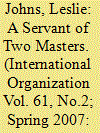

|
|
|
|
|
| Publication |
2007.
|
| Summary/Abstract |
International bureaucrats must often serve multiple principals who collectively choose policy. How does this affect bureaucrats' incentives to truthfully reveal their private information? I construct a cheap talk model in which a bureaucrat possesses private information about how policies translate into outcomes. The bureaucrat can communicate publicly observable messages about this information to two policymakers, who must then bargain over a set of policy choices. I find that both the bureaucrat's willingness to communicate informatively and the choice of an optimal bureaucrat are highly contingent on the bargaining powers of the two policymakers. When each policymaker is bound to adhere to the bargaining outcome, "moderate" bureaucrats are most preferred. In contrast, when at least one policymaker can leave the bargaining table and exercise an outside option, "biased" bureaucrats can be optimal. I illustrate my findings by examining UN weapons inspections in Iraq from 1991 to 2003.
|
|
|
|
|
|
|
|
|
|
|
|
|
|
|
|
| 2 |
ID:
157355
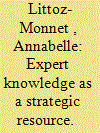

|
|
|
|
|
| Summary/Abstract |
This article asks how international secretariats can sometimes expand their authority in areas that relate neither to their mandate, nor to their sphere of expert authority. Existing explanations of mission creep assume that IOs act autonomously and expand in those areas that connect with their mandates, sense of organizational mission, and sphere of expert authority. The claim here is that entrepreneurial bureaucrats can succeed—in the absence of policy deadlock among states—in creating creep in unexpected issue domains through the mobilization of external expertise. The article examines this dynamic in the domain of bioethical standards. It shows that UNESCO acted as a first mover in the field, despite having no relevant expertise, and despite bioethics being more closely connected to the mandate of other organizations. Entrepreneurial bureaucrats within UNESCO were able to create creep in bioethics by mobilizing external experts in the field and capturing their skills. Working with external experts endowed their organization with the capacity to act, gave epistemic authority to their actions, and prevented the politicization of debates in a potentially controversial issue domain. In pointing to the strategic uses of expertise, the article challenges the commonly held view that expert knowledge acts as a means of solving problems and rationalizing global governance.
|
|
|
|
|
|
|
|
|
|
|
|
|
|
|
|
| 3 |
ID:
131489
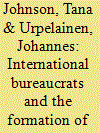

|
|
|
|
|
| Publication |
2014.
|
| Summary/Abstract |
Bureaucrats working in international intergovernmental organizations (IGOs) regularly help states design new IGOs. Sometimes international bureaucrats possess limited discretion in institutional design; sometimes, they enjoy broad discretion. In fact, they gain discretion even when they openly oppose state preferences. This contravenes conventional thinking about delegation: discretion should decrease as preference divergence between states and international bureaucrats increases. We develop a principal-agent theory of how much discretion states grant to international bureaucrats in the design of new IGOs. This is novel: while principal-agent theories of international delegation are common, scholars have not analyzed principal-agent relationships in the creation of new IGOs. We argue that even an international bureaucracy that disagrees with states' design preferences may enjoy substantial design leeway, because of states' need for bureaucratic expertise. In developing this argument, we employ a formal principal-agent model, case studies, and an original data set.
|
|
|
|
|
|
|
|
|
|
|
|
|
|
|
|
| 4 |
ID:
176492
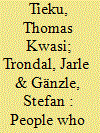

|
|
|
|
|
| Summary/Abstract |
This study contributes to the field of International Public Administration (IPA) and the emerging area of Informal International Relations (IIR) by examining the politics of staffing and recruitment of the African Union Commission (AUC). Although the AUC has become a major political player in international affairs, there is a dearth of knowledge about the civil servants who work for the AUC and who run this paramount pan-African executive body. To address the void, this paper draws on a survey of 137 AUC staff, archival studies and interviews to explore recruitment of AUC staff. Combining organisational theory and informality as analytical lenses, the study demonstrates that, first, many informal international practices (IIPs) are embedded in AUC recruitment processes. Second, the AUC is composed largely of short-term, contracted staff. Finally, it shows that the AUC is dependent on lower-ranked personnel or that it is bottom-heavy. Many of these lower-ranked officials are intimately involved in the making of AUC policies and decisions, putting into question the assumption in existing scholarship that decision-makers of IOs are primarily reliant on top-ranked A-level officials (senior management).
|
|
|
|
|
|
|
|
|
|
|
|
|
|
|
|
| 5 |
ID:
191854
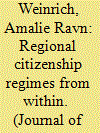

|
|
|
|
|
| Summary/Abstract |
This paper explores the Economic Community of West African States’ (ECOWAS) citizenship regime by investigating the institutional perceptions of five departments of the ECOWAS Commission. Creating a citizenship regime has been a central objective of the organisation's institutional framework but previous research has refrained from examining its multiplicity. The paper uses the concept of citizenship regime consisting of the dimensions rights, access, belonging and responsibility mix as the conceptual lens and draws on institutional documents and primary data from interviews conducted at the ECOWAS Commission. The paper contributes to current debates in citizenship studies and African regionalism and the literature on supra-national citizenship building, regional integration and governance research in Africa and elsewhere. The empirical data show that movement is central to the ECOWAS citizenship regime, whether formulated in terms of a right, as a way to facilitate access, or a way to establish a sense of regional belonging.
|
|
|
|
|
|
|
|
|
|
|
|
|
|
|
|
|
|
|
|
|